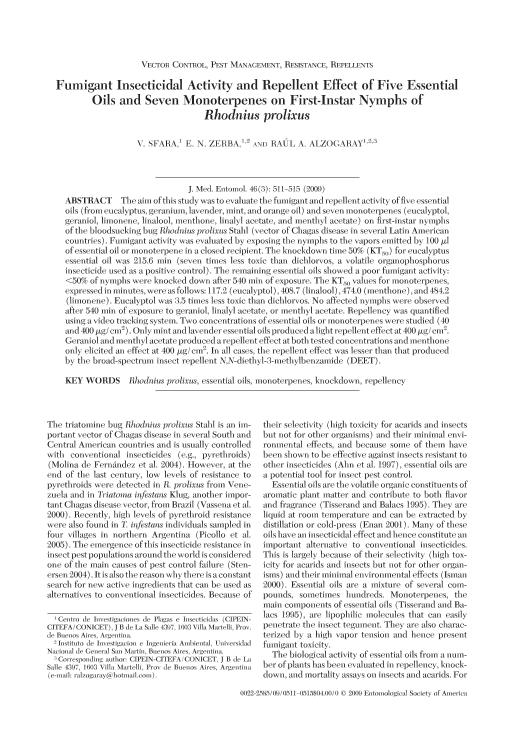Mostrar el registro sencillo del ítem
dc.contributor.author
Sfara, Valeria

dc.contributor.author
Zerba, Eduardo Nicolás

dc.contributor.author
Alzogaray, Raúl Adolfo

dc.date.available
2019-09-02T20:39:51Z
dc.date.issued
2009-05
dc.identifier.citation
Sfara, Valeria; Zerba, Eduardo Nicolás; Alzogaray, Raúl Adolfo; Fumigant insecticidal activity and repellent effect of five essential oils and seven monoterpenes on first-instar nymphs of Rhodnius prolixus; Entomological Society of America; Journal of Medical Entomology; 46; 3; 5-2009; 511-515
dc.identifier.issn
0022-2585
dc.identifier.uri
http://hdl.handle.net/11336/82775
dc.description.abstract
The aim of this study was to evaluate the fumigant and repellent activity of five essential oils (from eucalyptus, geranium, lavender, mint, and orange oil) and seven monoterpenes (eucalyptol, geraniol, limonene, linalool, fnenthone, linalyl acetate, and menthyl acetate) on first-instar nymphs of the bloodsucking bug Bhodnius prolixus Stahl (vector of Chagas disease in several Latin American countries). Fumigant activity was evaluated by exposing the nymphs to the vapors emitted by 100 pi of essential oil or monoterpene in a closed recipient. The knockdown time 50% (KT50) for eucalyptus essential oil was 215.6 min (seven times less toxic than dichlorvos, a volatile organophosphorus insecticide used as a positive control). The remaining essential oils showed a poor fumigant activity: <50% of nymphs were knocked down after 540 min of exposure. The KT50 values for monoterpenes, expressed in minutes, were as follows: 117.2 (eucalyptol), 408.7 (linalool), 474.0 (menthone),and 484.2 (limonene). Eucalyptol was 3.5 times less toxic than dichlorvos. No affected nymphs were observed after 540 min of exposure to geraniol, linalyl acetate, or menthyl acetate. Repellency was quantified using a video tracking system. Two concentrations of essential oils or monoterpenes were studied (40 and 400 μgl cm2). Only mint and lavender essential oils produced a light repellent effect at 400 μg/ cm2. Geraniol and menthyl acetate produced a repellent effect at both tested concentrations and menthone only elicited an effect at 400 μg/cm2. In all cases, the repellent effect was lesser than that produced by the broad-spectrum insect repellent N,N-diethyl-3-methylbenzamide (DEET).
dc.format
application/pdf
dc.language.iso
eng
dc.publisher
Entomological Society of America

dc.rights
info:eu-repo/semantics/openAccess
dc.rights.uri
https://creativecommons.org/licenses/by-nc-sa/2.5/ar/
dc.subject
Bhodnius Prolixus
dc.subject
Essential Oils
dc.subject
Knockdown
dc.subject
Monoterpenes
dc.subject
Repellency
dc.subject.classification
Zoología, Ornitología, Entomología, Etología

dc.subject.classification
Ciencias Biológicas

dc.subject.classification
CIENCIAS NATURALES Y EXACTAS

dc.title
Fumigant insecticidal activity and repellent effect of five essential oils and seven monoterpenes on first-instar nymphs of Rhodnius prolixus
dc.type
info:eu-repo/semantics/article
dc.type
info:ar-repo/semantics/artículo
dc.type
info:eu-repo/semantics/publishedVersion
dc.date.updated
2019-08-26T18:38:05Z
dc.journal.volume
46
dc.journal.number
3
dc.journal.pagination
511-515
dc.journal.pais
Estados Unidos

dc.journal.ciudad
Lanham
dc.description.fil
Fil: Sfara, Valeria. Consejo Nacional de Investigaciones Científicas y Técnicas. Instituto de Investigaciones Científicas y Técnicas para la Defensa. Centro de Investigación de Plagas e Insecticidas; Argentina
dc.description.fil
Fil: Zerba, Eduardo Nicolás. Consejo Nacional de Investigaciones Científicas y Técnicas. Instituto de Investigaciones Científicas y Técnicas para la Defensa. Centro de Investigación de Plagas e Insecticidas; Argentina. Universidad Nacional de San Martín. Instituto de Investigación en Ingeniería Ambiental; Argentina
dc.description.fil
Fil: Alzogaray, Raúl Adolfo. Consejo Nacional de Investigaciones Científicas y Técnicas. Instituto de Investigaciones Científicas y Técnicas para la Defensa. Centro de Investigación de Plagas e Insecticidas; Argentina. Universidad Nacional de San Martín. Instituto de Investigación en Ingeniería Ambiental; Argentina
dc.journal.title
Journal of Medical Entomology

dc.relation.alternativeid
info:eu-repo/semantics/altIdentifier/url/https://academic.oup.com/jme/article-abstract/46/3/511/859504
dc.relation.alternativeid
info:eu-repo/semantics/altIdentifier/doi/https://doi.org/10.1603/033.046.0315
Archivos asociados
